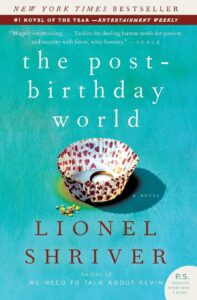I know I am really enjoying a book when I find myself thinking about it at odd times throughout the day (in the shower, while walking the dog, etc.) and trying to cram in pages here and there whenever I can so that I can get back into the story as soon as possible. Such was the case with the current EDIWTB online book club selection, The Post-Birthday World, by Lionel Shriver. I have a feeling that this is a book that will stay with me for a long, long time.
Shriver’s inventive novel opens with Irina, its fortyish protagonist, facing a decision: should she remain faithful to Lawrence, her steadfast policy wonk partner of ten years, or should she kiss another man – Ramsey, a dashing yet immature snooker player? The first chapter ends at that crossroads, and from there, alternating chapters relate the two different worlds that could follow – the one in which she resists temptation, and the one in which she gives in. Of course, Irina’s life turns out very differently depending on which road she takes, thus following the classic “what if…” daydream to its natural conclusion.
Shriver creates a detailed, convincing, flawed, yet rewarding life for Irina under both scenarios, which only makes reading this book more complex and almost tortuous, in a good way. I found it difficult to condemn either of her choices, or either of her partners. The two men were often infuriating, yet also seemed to redeem themselves in often surprising ways. Thus, if one of Shriver’s intentions was to convey the messy unpredictability of life and the danger of seeing things in black and white, she succeeded.
I love Shriver’s writing – eloquent, insightful, funny, rich. My copy is full of dog-eared pages marking passages I want to re-read – passages that were so well-written that they took my breath away.
Readers of The Post-Birthday World will also notice the deftness with which Shriver sets up small parallels between the two worlds – lines of dialogue, for example, that are repeated in the two “competing” chapters (though sometimes spoken by two different characters), or identical conversations or plot points that are treated differently depending on which world we’re in (the Ramsey world or the Lawrence world). Even something as simple as which dress Irina wears to the same event (or her partner’s reaction to that dress) takes on great significance in each post-birthday world, especially when contrasted to how it takes place in the other world.
While I was reading the book, one thing kept bothering me. I felt that Shriver had taken some license with Lawrence (as is her right, of course) – in one scenario, he seemed to have one personality, and in the other, he was very different. This bothered me because I felt like she was stacking the decks in favor of one choice vs. the other, that she was prejudicing the reader.
I was extremely lucky to be able to attend a book reading by Lionel Shriver last Friday night at Politics & Prose, and even luckier to be able to tell her in person about this reservation I had about the book. Her answer was perfect, and enhanced my appreciation and understanding of the book. As she explained, the book is not just about Irina; it’s also about the other characters in the book and how they are affected by Irina. Her actions toward them – in this case, the reception she gives Lawrence when he returned from the business trip that provided her the opportunity to be alone with Ramsey, ultimately affected his path, as well as hers. Shriver intentionally played with how Irina’s actions changed the lives of the others in the book.
Here are some other things I learned at the book reading:
- She wrote the chapters in the order in which they appear in the book, instead of writing about one post-birthday world in its entirety and then the next. This made it possible for her to set up the parallel narrative constructs that I mentioned above.
- In writing the book, Shriver was interested in “the little stuff” – how who you are with affects not just your happiness but everything in your life, down to your relationship with your mother, what it’s like to go to the supermarket, your success in your career, etc.
- The last chapter, in which Irina meets Lawrence for a drink at Club Gascon, is meant to conclude both post-birthday worlds, just like the first chapter opened them both. (Did you notice that when you were reading it?)
- Shriver doesn’t like reading non-fiction and will only do it if “a gun is put to [her] head”.
- Shriver was born in America and doesn’t speak with a British accent.
- In England, “snooker” rhymes with “euchre”, while in America, it rhymes with “looker”.
I could go on and on about this book – it seems that every day I have new thoughts about it, new insights, and new appreciation for Shriver’s writing and the perfect construction of this wonderful book. But I have written enough and I’d love to hear what other EDIWTB readers have to say. So please add your comments below, and if you have any questions for Lionel Shriver that you’d like her to answer, add them to your comment or email them to me at gweiswasser@gmail.com and I will send them along to her. She has promised to answer them in a later post.











About Me
I have been blogging about books here at Everyday I Write the Book since 2006. I love to read, and I love to talk about books and what other people are reading.